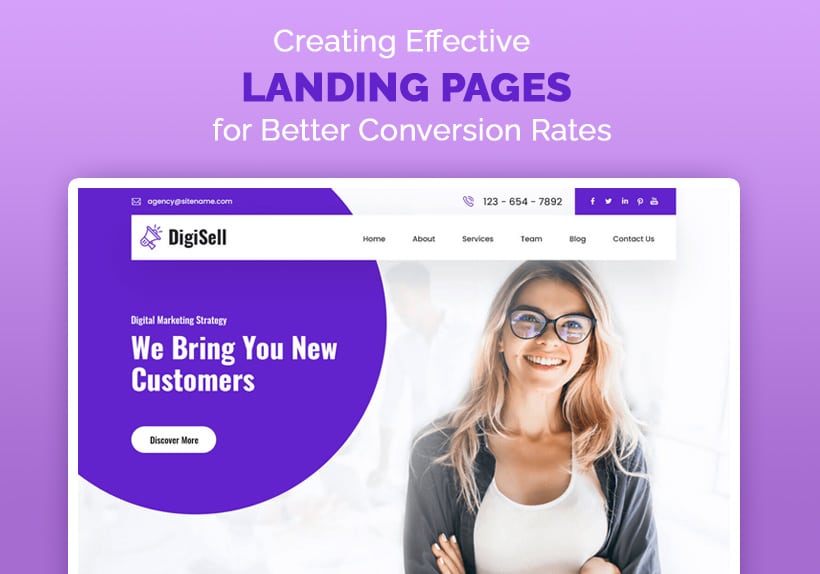Creating Effective Landing Pages for Better Conversion Rates

In the fast-paced world of digital marketing, a captivating and engaging website is crucial to capture the attention of potential customers.
Landing pages are often the first impression a visitor has of your business, making it essential to create an effective and user-friendly experience that entices visitors to stay, explore, and eventually convert into loyal customers. With so much riding on your landing page’s performance, it’s vital to understand the strategies and best practices for designing a conversion-driven experience.
This article will provide valuable insights into what makes a successful landing page and how you can optimize yours for better conversion rates. From understanding the psychology behind user engagement to practical design techniques, you’ll discover actionable tips that can make a significant impact on your online presence.
Read on to unlock the secrets of creating powerful landing pages that drive conversions and boost your business’s success.
Implementing Effective Visual Elements and Design Principles
Visual elements play a crucial role in creating an engaging user experience. High-quality images, videos, or illustrations can help convey complex ideas more easily and quickly than text alone. They also contribute to establishing trust and credibility with your audience.
When designing your landing page, adhere to fundamental design principles such as visual hierarchy, balance, white space, and typography to create a cohesive and aesthetically pleasing layout. This not only enhances readability but also contributes to a positive user experience that encourages visitors to explore further.
If you are struggling with doing this on your own, consider working with a professional SEO agency that specializes in creating high-converting landing pages. These organizations have all the experience and resources necessary to ensure your page meets the criteria required for success. From WordPress SEO services to optimizing your website for Google Ads and beyond, they can help take your business to the next level.
Understanding User Behavior and Its Impact on Conversions
To create a high-converting landing page, it’s essential to understand the psychology behind user behavior. By analyzing how visitors interact with your website, you can identify their needs, preferences, and motivations, allowing you to design a more personalized and engaging experience. Consider factors such as users’ attention span, the device they’re using, and their browsing habits. Additionally, incorporate elements like social proof, scarcity, and urgency to encourage users to take action and increase the likelihood of conversion.
To illustrate the point, let’s say you’re selling a limited-edition product. By displaying a countdown timer or a progress bar showing how many units are left in stock, you can create a sense of urgency that compels users to take action. Similarly, by featuring customer reviews and testimonials, you can establish trust and credibility with your audience, further increasing the likelihood of conversion.
Crafting Compelling Headlines and Calls-to-Action
The headline is often the first thing a visitor sees when they arrive on your landing page. To capture their attention and spark interest, create a powerful headline that communicates the value of your offering succinctly and clearly. Make sure it aligns with your target audience’s needs and desires while also showcasing your unique selling proposition (USP).
Calls-to-action (CTAs) are equally important, as they guide users toward taking the desired action on your page. Ensure that your CTAs are clear, concise, and visually prominent. Experiment with different colors, sizes, and wording to determine the most effective combination for driving conversions.
Streamlining Navigation and Simplifying Forms
A clean and straightforward navigation structure allows users to find what they need quickly and seamlessly, reducing the likelihood of them leaving your site prematurely. Eliminate unnecessary distractions and focus on guiding users to the primary action you want them to take.
When it comes to forms, simplicity is key. Minimize the number of fields and only request essential information to avoid overwhelming users. If possible, use smart defaults or auto-fill options to make the process even more convenient and user-friendly.
Analyzing Performance Metrics and A/B Testing for Optimization
Continuously monitoring your landing page’s performance is crucial for identifying areas that need improvement. Track metrics such as bounce rate, time on page, and conversion rate to gain insights into user behavior and engagement.
A/B testing different landing page variations can help you determine what works best for your audience. Experiment with headlines, CTAs, visual elements, and other components to optimize your page for maximum conversions. Remember that small changes can sometimes lead to significant improvements in performance.
Conclusion
Creating an effective and high-converting landing page is a multifaceted process that requires a deep understanding of user behavior, impactful design elements, and continuous optimization.
By applying the insights and best practices outlined in this article, you can make a captivating landing page that not only captures your audience’s attention but also drives conversions and boosts your business’s success.
Remember to stay up-to-date with the latest trends and technologies in digital marketing to ensure your landing page remains relevant and effective. With dedication, creativity, and data-driven decision-making, you can unlock the true potential of your online presence and achieve lasting growth. Good luck!


